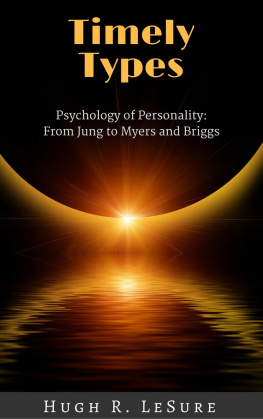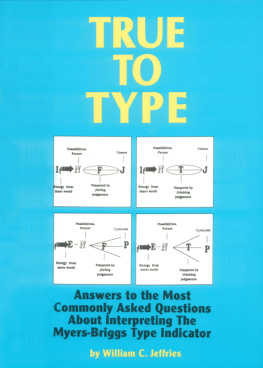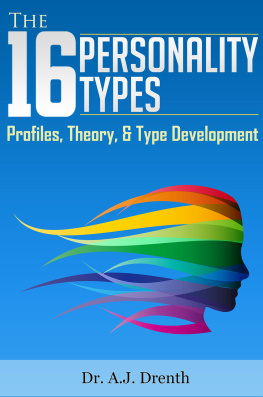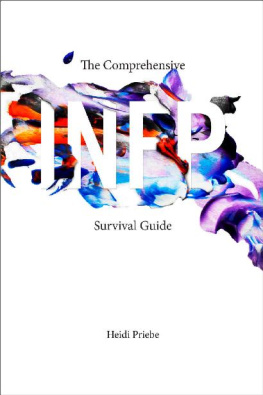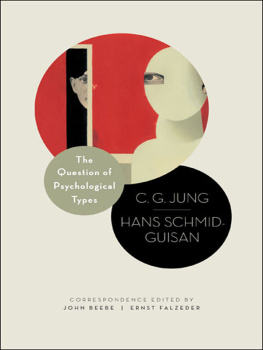Hugh R. LeSure - Timely Types: The Psychology of Personality: From Jung to Myers and Briggs
Here you can read online Hugh R. LeSure - Timely Types: The Psychology of Personality: From Jung to Myers and Briggs full text of the book (entire story) in english for free. Download pdf and epub, get meaning, cover and reviews about this ebook. year: 2017, publisher: Tetragram Press, genre: Religion. Description of the work, (preface) as well as reviews are available. Best literature library LitArk.com created for fans of good reading and offers a wide selection of genres:
Romance novel
Science fiction
Adventure
Detective
Science
History
Home and family
Prose
Art
Politics
Computer
Non-fiction
Religion
Business
Children
Humor
Choose a favorite category and find really read worthwhile books. Enjoy immersion in the world of imagination, feel the emotions of the characters or learn something new for yourself, make an fascinating discovery.
- Book:Timely Types: The Psychology of Personality: From Jung to Myers and Briggs
- Author:
- Publisher:Tetragram Press
- Genre:
- Year:2017
- Rating:4 / 5
- Favourites:Add to favourites
- Your mark:
Timely Types: The Psychology of Personality: From Jung to Myers and Briggs: summary, description and annotation
We offer to read an annotation, description, summary or preface (depends on what the author of the book "Timely Types: The Psychology of Personality: From Jung to Myers and Briggs" wrote himself). If you haven't found the necessary information about the book — write in the comments, we will try to find it.
Are you sick of MBTI books that only repeat what you already know? Do you desire deeper, more enriching connections with your loved ones? Are you tired of self-help books that do everything but help?
For years, countless people have relied on Mr. LeSures proven insights into Jungian psychology, the Myers-Briggs type indicator and personality theory to improve their quality of life and establish fulfilling relationships. Mr. LeSure has now pulled his years of research, study and experience with personality types into this amazing, easy-to-use book.
MBTIs four-letter codes, like INFJ or INTP, dont merely describe personality types. These codes can also help people overcome their fears, boost their confidence and enhance their social lives. Most importantly, MBTI theory can empower people to understand themselves better. Carl Jung wrote, It is a general truth that one can only understand anything in as much as one understands oneself.
Too often, lopsided descriptions have crippled those who thirst for the authentic, uplifting wisdom MBTI typology has the potential to unlock. While many Myers-Briggs resources do an admirable job describing the attitude of the conscious mind, most only touch the surface; because the psyche consists not only of the conscious mind, but also the unconscious mind.
Fortunately, Timely Types is guaranteed to assist those who are devoted to making the most of this powerful resource. Because it places the fundamental polarity between conscious and unconscious minds at the heart of its investigation, Timely Types not only outlines MBTI theory, explains the cognitive functions and offers compelling descriptions of all 16 personality types, it also restores Myers and Briggss important work back into the broader context of Jungian psychology.
After reading this book, youll know all about the following:
About the Cover
The difference between the natural individuation process, which runs its course unconsciously, and the one thats consciously realized, is tremendous. In the first case, consciousness nowhere intervenes; the end remains as dark as the beginning. In the second case, so much darkness comes to light that the personality is permeated with light, and consciousness necessarily gains in scope and insight. The encounter between conscious and unconscious has to ensure that the light which shines in the darkness is not only comprehended by the darkness, but comprehends it. -Jung
If you need the peace and happiness that can only come from thoroughly understanding yourself and others, get your copy of Timely Types today.
Myers-Briggs Type Indicator, Myers-Briggs, MBTI and MBTI Logo are trademarks or registered trademarks of the MBTI Trust, Inc., in the United States and other countries.
Hugh R. LeSure: author's other books
Who wrote Timely Types: The Psychology of Personality: From Jung to Myers and Briggs? Find out the surname, the name of the author of the book and a list of all author's works by series.

